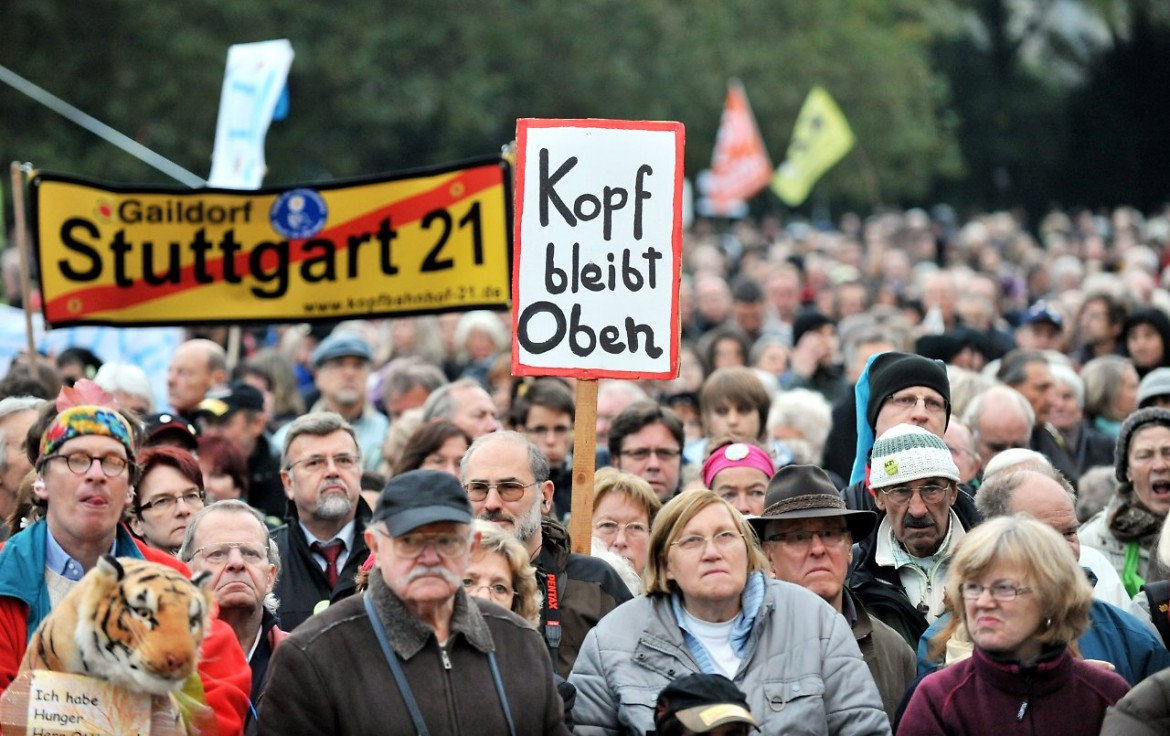Analysis
The German railway nightmare
The Stuttgart-21, a 57-kilometer rail project, was supposed to cost €4 billion and take eight years to construct. The price tag has nearly doubled in the decades since. Environmentalists call it an unnatural disaster.

There’s a running joke in Germany about the new Willy Brandt Airport in Berlin, which was supposed to open 10 years ago, and, if all goes well, should be completed by 2020. People are also commenting on the resounding flop of the inaugural run of the high-speed train from Berlin to Monaco, which arrived two hours behind schedule. But the most egregious public works nightmare in Germany is without a doubt “Stuttgart-21”: 57 kilometers of railway which have been under construction for eight years.
A large-scale project designed in 1994, it was supposed to cost around €4 billion, but it has already burned through more than €7.6 billion. It is a black hole in the public finances, not only of the Baden-Württemberg region but also of the federal government, while the sinkholes in the Jura Mountains, caused by bulldozers going into the tunnels, are getting larger and larger.
For the Merkel government, this is a strategic piece of infrastructure, the backbone of the Paris-Vienna corridor. According to environmentalists, it is “yet another unnecessary and harmful work of devastation of the land, which will destroy biodiversity in the southwest of Germany.” On account of this, they will organize on Jan. 15 what is already their 400th protest, in the square in front of Stuttgart Central Station.
Tomorrow will be an “open doors day” at the work site: the Stuttgart-Ulm Railroad Association is expecting 20,000 visitors. It is a way to present the first section of the new railway to the inhabitants of Stuttgart—something between a PR operation and the obligation of transparency they now have after allegations of secretiveness concerning all the aspects of the project, from the design and execution to the enormous cost which is rising ever higher.
On Dec. 13, at the Railway Tower in Potsdamer Platz in Berlin, the Supervisory Board of Deutsche Bahn (DB) had to reckon with yet another sharp rise in the costs of “Stuttgart-21.” And last Wednesday, the DB’s Supervisory Board had to discuss again the endless problems of the mega-project: the impact on the current local train traffic, the chaos caused by technical failures on the line, and not least the endless increases in costs.
These cost overruns concern everything, from the underground transit station (a main railway hub) to the 25 kilometers of high-speed line, and especially the more than 30 kilometers of tunnels. Given the current state of accounts, the amount of public money which needs to be added to the budget is €1 billion, while the final cost of “Stuttgart-21” will rise to over €7.6 billion. And this does not count the economic impact caused by pushing back the inauguration of the railway, now slated for the spring of 2024.
This is why the federal government and the leadership of the DB are finding themselves under pressure, with the very public charges made by Winfried Hermann, Transport Minister of Baden-Württemberg, elected on the list of the Greens. It was a full-blown explosion of indignation by the minister, sparing none of those involved, in whichever capacity.
“In Germany, we are witnesses to the public financing of major projects which always turn out to be more expensive than expected, and they undermine the credibility of the government’s policy in the eyes of the citizens,” Hermann said. “The cost estimates, as well as the deadlines, are shown to be so unrealistic as to be exceeded again and again, as in the case of Stuttgart-21.” As a result, the minister warned, the Baden-Württemberg region “will not pay one cent more than the €930.6 million already allocated,” and he was quick to point to the similar cases of the Willy Brandt airport in Berlin and the new Elbe Philharmonic Hall in Hamburg.
Meanwhile, the environmentalist mobilization is proceeding apace, proposing alternative routes with less environmental impact and a much smaller price tag. This is the substance of the “Umstieg-21” (Change-21) project, which “would cost €4 to €5 billion less than the current plan,” according to Martin Vieregg, one of the most reputable rail traffic experts in Germany. This counter-proposal is supported by the recurrent bicycle demonstration that is taking place in Stuttgart every Monday, starting from the Feuersee lake, as well as the weekly demonstration in the city’s Palace Square.
It is a mobilization that shows no signs of waning, and which arose in the wake of the first major popular “revolt” against the mega-project, dating back to 2010. At that time, 100,000 people took to the streets against former mayor Wolfgang Schuster, who had promised six years earlier to hold a popular referendum if the additional costs ended up exceeding €200 million. Such a public consultation would have been useless anyway, since the project is not funded only by Stuttgart, and the Swabian capital does not have the authority to renegotiate the proposed route.
In the end, the protocol signed in April 2009 between former Governor of Baden-Württemberg Günther Oettinger, the Federal Ministry of Transport, and the DB, setting a maximum budget of €4.5 billion for the project, remains in effect. Its provisions having been ignored, it is currently under the scrutiny of the German Court of Auditors, which estimates that when all is said and done, “Stuttgart 21” will end up costing the grand sum of €10 billion.
And all of this despite the legendary German reliability, accuracy and precision, which are showing themselves to be, in effect, nothing more than platitudes.
Originally published at https://ilmanifesto.it/la-ferrovia-e-un-incubo/ on 2018-01-06
